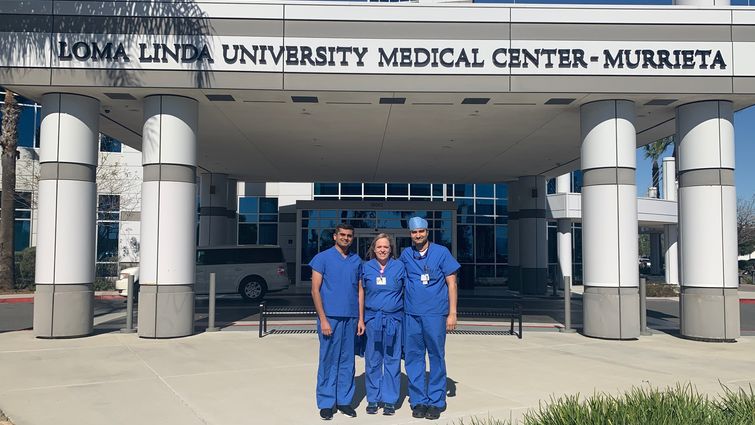
Loma Linda University Medical Center – Murrieta successfully performed its first left atrial appendage closure with the use of a device called the Watchman™ to treat a patient with atrial fibrillation (AFib).
AFib is a condition in which a patient experiences irregular heart rhythm. The condition is associated with a fivefold increase in stroke risk. Watchman is an FDA-approved device designed for patients with nonvalvular atrial fibrillation and is a one-time procedure that does not need to be replaced.
To perform the minimally invasive procedure, the device is inserted through a catheter in the upper leg and guided to the heart. Once placed, the device expands to close off the extra space in the appendage. The procedure is conducted under general anesthesia and takes about an hour. Patients commonly stay in the hospital overnight and leave the next day.
The inaugural surgery was performed Monday, Feb. 3 by Harit Desai, MD, an interventional cardiologist, and Niraj Parekh, MD, a cardiologist and director of cath lab and structural heart interventions at Loma Linda University Medical Center – Murrieta. Parekh said the structural heart team is proud to offer this latest breakthrough for those in the community diagnosed with AFib.
“This device is an attractive alternative for patients with non-valvular Afib at risk for a stroke, especially those with a compelling reason not to be on blood thinners,” Parekh said. “The addition of the Watchman device to our cardiovascular services is a testament to our continued efforts to bring quality care and advanced structural heart treatments to Southwest Riverside communities.”
AFib is the most common heart rhythm disorder, affecting 6 million people in the United States. Common symptoms include persistent heart palpitations, dizziness, light-headedness, fatigue, shortness of breath or confusion. Moreover, AFib can coexist with other diseases such as high blood pressure, diabetes, vascular disease or kidney disease. If left untreated, complications such as stroke and arrhythmia can occur. Parekh recommends that patients with AFib have their condition regularly monitored by a specialist to assess if treatment is needed.
Parekh said having a minimally invasive treatment for those with AFib close to home is a necessity and will positively impact the patients and families in the community.
“It’s estimated that AFib will grow in prevalence to over 12 million Americans by 2020,” Parekh said. “It’s vital that we are able to provide advanced technologies and options for patients battling heart disease in our community.”
To learn more about the Watchman device and other heart care services at Loma Linda University Medical Center — Murrieta, visit the Heart Care website or call 951-290-4314.
